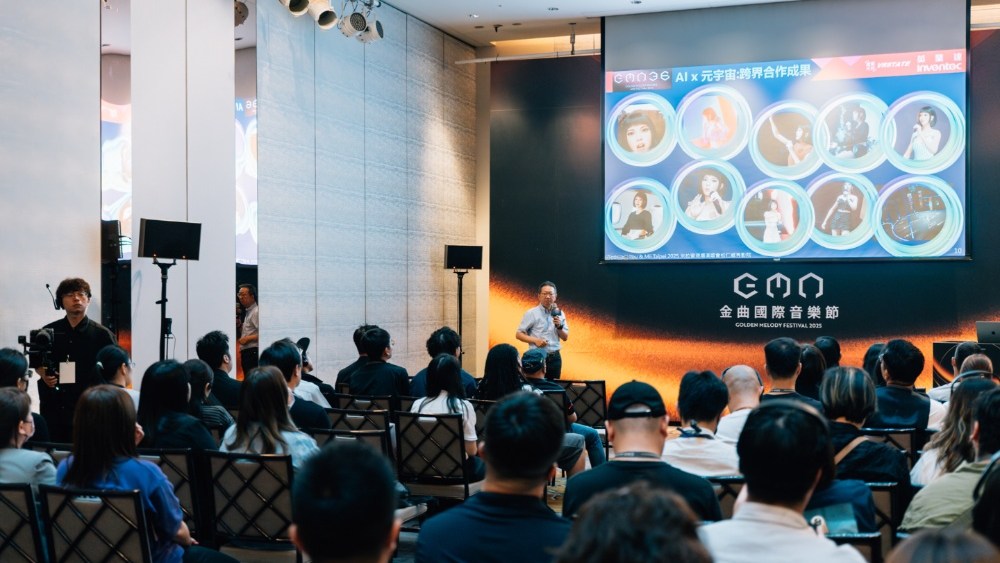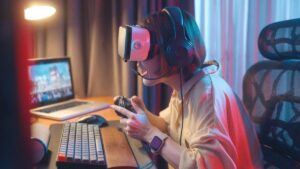AI Star Mila Shines at Golden Melody Festival’s Virtual Idol Talk

The Rise of AI-Generated Virtual Artists at Taipei’s Golden Melody Festival
A Gathering of Music Innovators
The Golden Melody Festival in Taipei attracted music industry professionals from across Asia and beyond, featuring a series of matchmaking events, showcases, and discussions aimed at enhancing the Mandarin-language music landscape.
- A Gathering of Music Innovators
- Exploring AI in Music Creation
- Introducing Mila: The Future of Music
- Beyond a Simple Avatar
- Emotional Connections with Fans
- Engaging Fans in New Ways
- The Concept of Co-Creative Companionship
- Navigating Ethical and Creative Challenges
- Responsible Design and Cultural Sensitivity
- The Future of AI in Music
- AI as a Collaborative Partner
Exploring AI in Music Creation
During the festival’s inaugural pitching session, industry experts convened to delve into a topic that is rapidly transitioning from speculative fiction to mainstream reality: the emergence of AI-generated virtual musicians.
Introducing Mila: The Future of Music
The session, titled “Creating the Artist of the Future: An AI × metaverse Innovation Lab,” spotlighted Mila, an AI-driven virtual singer designed to thrive in the metaverse. Eric Chen, CEO of Enjoy Record Co., and Chaucer Chiu, senior VP of Inventec Corporation, shared insights on the philosophies and opportunities surrounding this innovative digital artist.
Beyond a Simple Avatar
Mila transcends the concept of a mere 3D avatar with a synthesized voice; she embodies a sophisticated ecosystem that integrates AI-driven personality development, real-time metaverse interactions, and a blend of cultural influences in her visual and vocal presentation. Her creation involved advanced sound engineering, text-to-speech technology, and powerful AI computing resources.
Emotional Connections with Fans
Mila is envisioned as “an extension of human emotion,” offering a new paradigm for the relationship between fans and artists. Chen remarked to Variety that the emotional ties formed with virtual idols can be just as strong, if not stronger, than those with traditional artists, as they can transcend barriers of language, geography, and time.
Engaging Fans in New Ways
The development team found that utilizing AI for personality design, interactive voice features, and customized social media content allows fans to connect with Mila at any time, fostering deeper emotional connections.
The Concept of Co-Creative Companionship
“This ‘co-creative companionship’ facilitates a level of engagement that traditional artists may find challenging to achieve,” Chen noted.
Navigating Ethical and Creative Challenges
However, the journey toward virtual stardom is not without its challenges, particularly in terms of creativity and ethics. The technical aim is to create virtual artists that feel both authentic and unique, but the true artistic hurdle lies in instilling a sense of “soul” that convinces audiences there is depth beyond the digital facade.
Responsible Design and Cultural Sensitivity
Equally important is ensuring that an AI artist’s persona respects cultural and ethical norms. Chen emphasized that every aspect of Mila’s behavior, language, and visual representation must undergo a thorough design and review process. He added that music producers must remain vigilant about issues of attribution, originality, and emotional authenticity in their creative endeavors.
The Future of AI in Music
Looking forward, Chen anticipates that AI-generated music will gain traction, but its success on the charts will hinge on elements that algorithms cannot replicate: the human touch and emotional depth.
AI as a Collaborative Partner
“We view AI not as a substitute, but as a partner in creativity,” Chen explained. He envisions a future where the mainstream music landscape incorporates “AI-assisted creation,” “AI-optimized production,” and even “AI personality artists,” while emphasizing that the essence will always lie in the emotional resonance of the content. Without that connection, even the most sophisticated algorithms risk becoming mere background noise.







